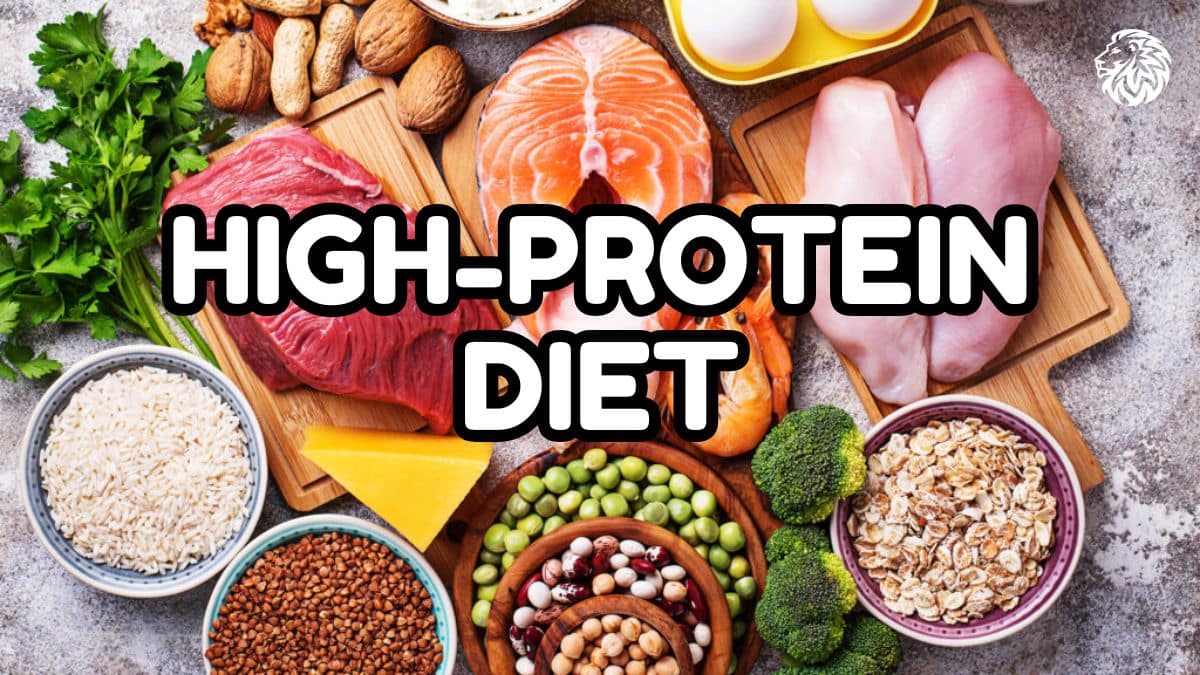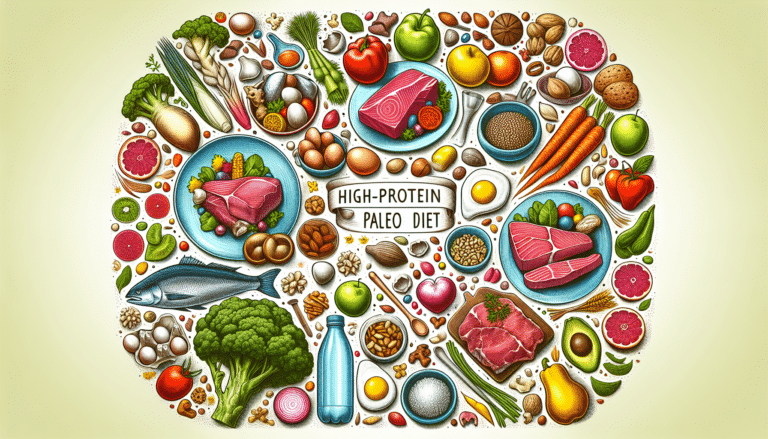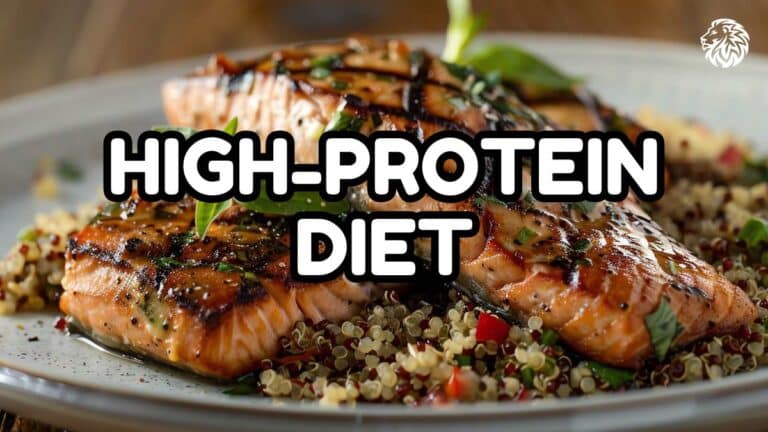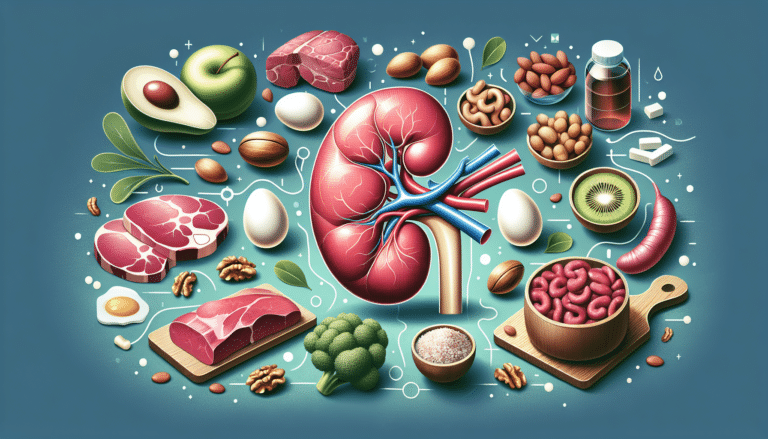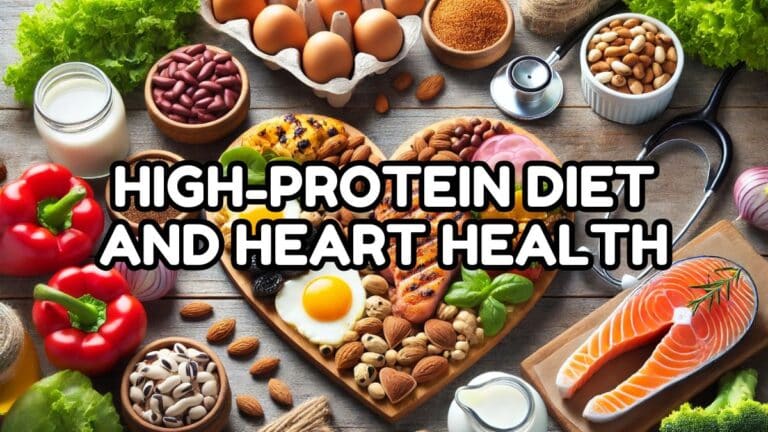Understanding High-Protein Diets
Benefits of a High-Protein Diet
Everyone’s buzzing about high-protein diets these days, mainly because they’ve scored some major points in the health department, particularly for folks keeping an eye on diabetes. So, what’s the scoop on this protein-packed lifestyle?
- Feel Fuller for Longer: Chomping down on protein-rich grub helps keep that hunger monster at bay. It’s like your stomach gets the memo to chill out, which makes managing your weight – a biggie for diabetes control – a tad easier.
- Muscle Magic: Protein plays the superhero role when it comes to fixing and pumping up those muscles. Hit the gym regularly? You’ll want to pay attention to this one (NCBI).
- Rev Up Your Metabolism: Processing all that protein fires up your metabolism, burning more calories even when you’re binge-watching your favorite shows.
- Evened-Out Blood Sugar: While protein might not have a direct handshake with sugar, it slows down how fast carbs hit your bloodstream, offering a smoother ride for blood sugar levels (Verywell Health).
Curious to know more nitty-gritty details? Peek into our article for more high-protein diet perks.
Risks of Prolonged High-Protein Diets
Now, while digging into high-protein meals sounds fab, there’s a flipside you gotta watch out for, especially for our diabetic peeps:
- Kidneys Working Overtime: Too much protein can give your kidneys an unsolicited workout. If diabetes has already thrown your kidneys a curveball, be extra cautious (MedlinePlus).
- Missing Nutrients Alert: Going all-in on protein might sideline those important vitamins and nutrients hiding in other yummy foods. Keep that food rainbow colorful (Mayo Clinic).
- Gut Grumbles: Skipping out on fiber can make your digestive system throw a hissy fit, leading to some unwanted toilet troubles.
- Heart on the Line: High-protein eats that come from animals might wave a red flag for heart health (National Center for Biotechnology Information). Need more heart-to-heart info? Head on over to our heart and high-protein connection.
Keeping these cons in mind, it’s smart to mix things up on your plate and have a chat with the doc for tailor-made advice. Check out more on protein intake tips for diabetes warriors and get juicy ideas on meal plans to shed those extra pounds.
High-Protein Diets and Diabetes
High-protein munchies can shake up your diabetes game. Wrapping your head around how they help might lead you to better food choices.
Impact of High-Protein Diets on Diabetes
Here’s the scoop: high-protein diets can boost insulin sensitivity and keep your blood sugar from getting too rowdy after you eat. Both critters and folks have shown us this (NCBI). But don’t go celebrating just yet—studies can’t agree whether these diets kick other meal plans to the curb. Sticking with it and dodging the dropout shuffle is another story, especially over the long haul.
Even if the jury is still out, there’s a glimmer of promise that high-protein diets can take on Type 2 Diabetes Mellitus (T2D) like a champ. There’s great potential, but the folks running these studies aren’t working with football teams or timelines that could scare off a fruit fly (NCBI).
| Study | Duration | Participants | Outcome |
|---|---|---|---|
| Study 1 | 8 weeks | 32 | Insulin got happier |
| Study 2 | 24 weeks | 15 | Results all over the place |
Protein Sources and Diabetes
Picking the right protein can make a difference in steering your diabetes. You got your animal stuff and plant munchies, each playing different roles in the diabetes parade.
Animal Protein
The lowdown on animal protein is all over the place. Overload on red meat and you might be buddying up with T2D. But bring refined grains along for the ride and the risk takes a nosedive (Diabetology & Metabolic Syndrome).
Plant Protein
Plants turn the tables on T2D, especially if you’re digging into legumes and seafood. More of these green goodies can knock down your diabetes bet (Diabetology & Metabolic Syndrome).
Start shaking up your plate with our best high-protein foods guide.
| Protein Source | Impact on T2D |
|---|---|
| Red Meat | Risk goes up |
| Refined Grains | Risk goes down |
| Legumes & Seafood | Risk goes down |
For some meal plans that pack a punch, check out high-protein diet meal ideas or if you’re going the no-meat path, there’s vegetarian high-protein diet. Getting a handle on your protein picks will help balance your diet to keep diabetes in check.
Research on High-Protein Diets and Diabetes
When you’re handling diabetes, tweaking your diet to include high-protein foods can have all kinds of effects. Knowing how different kinds of protein act can steer you towards smarter food choices.
How Protein Amount Ties to Type 2 Diabetes
Turns out, packing in a lot of protein might boost your odds of running into type 2 diabetes (T2DM). Yep, the numbers don’t lie. People with hefty protein diets seem to face a higher chance of developing this form of diabetes. Research backs that up, with stats showing a hefty odds ratio for T2DM linked with high protein chow. Watch those numbers closely, as it’s a cue to sip on the protein shake carefully.
| Protein Type | Odds Ratio (T2DM) |
|---|---|
| Total Protein | 3.12 (1.65–5.91) |
| Animal Protein | 3.48 (1.87–6.60) |
Source: (Diabetology & Metabolic Syndrome)
Animal vs. Plant: The Protein Showdown
It’s not just how much protein you eat, but what kind you put on your plate. Red and processed meats love escalating diabetes risks. Dive into the data, and you’ll see that munching 50g more of red meat daily spikes your diabetes risk by 11%. Load up on processed meat, and you’re looking at a 41% increase (NCBI).
On the flip side, plant protein is like your diabetes guard dog. Fill your plate with legumes and seafood, and you’ll push diabetes risks out your front door. These nuggets are your shorter route to healthy diabetes management.
| Protein Source | Risk of T2DM |
|---|---|
| Red Meat | +11% per 50g/day |
| Processed Meat | +41% per 50g/day |
| Plant Protein | Inversely Related |
Source: (Nutrients)
Curious about managing proteins smartly? Check out our links on high-protein diet benefits and must-try high-protein foods.
Food Groups at Play with Diabetes
Different grub groups mess with your diabetes risk differently. Red meat and those processed meat goodies? They crank up your diabetes odds. But dairy, especially yogurt? That’s like a ticket to lowering those risks! A neat analysis says processed meat is the notorious villain (Nutrients) when it comes to spiking diabetes probabilities.
| Food Group | Impact on T2DM Risk |
|---|---|
| Red Meat | Increased Risk |
| Processed Meat | Increased Risk |
| Yogurt | Reduced Risk |
Adding top-notch plant-based proteins, like beans and peas, can smash diabetes risks. Check our guide on vegetarian high-protein diet for more tasty tips.
By knowing the tale of different proteins and diabetes, you’re armed to sculpt a smart diet that haggles well with health. Tweak your animal and plant protein gambit and peek at our high-protein diet meal ideas to fill your menu with balance.
High-Protein Diet Studies and Diabetes Control
If you’re checking out the perks of a high-protein diet, especially when dealing with diabetes, dive into how these diets can mess with your blood glucose readings. We’ll look at what happens to your glucose response, your glycated hemoglobin (HbA1c) levels, and those pesky fasting blood glucose numbers.
Glucose Response to High-Protein Diets
Loadin’ up on protein usually means your blood sugar doesn’t bounce around like a wild pogo stick. For folks with type 2 diabetes, one study showed a hefty 40% drop in the average 24-hour glucose area response. Fancy speak for “your sugar doesn’t go nuts after a meal” when you eat more protein and fewer carbs.
| Metric | Response |
|---|---|
| 24-Hour Glucose Rock ‘n’ Roll | Chill out by 40% |
Effect on Glycated Hemoglobin Levels
So, HbA1c is the number you wanna keep an eye on—kinda like your report card for how sugar’s been behaving over the last couple of months. People who swapped to a high-protein diet saw their HbA1c scores dip by about 0.8% in just five weeks, compared to 0.3% on a regular diet. Pretty nifty, right?
| Diet Type | HbA1c Level Drop |
|---|---|
| High-Protein Diet | -0.8% |
| Regular Diet | -0.3% |
But don’t start chucking those carbs just yet—more long-haul studies are needed to see if this holds up and doesn’t throw in any curveballs.
Fasting Blood Glucose Levels
Your fasting sugar levels, grabbed after you’ve been snoozing, are another key to seeing how your diabetes is rollin’. Protein helps cool down carb absorption, so your sugar doesn’t act like it’s on a sugar rush.
Protein ain’t a sugar kicker, but it does slow down how fast sugars hit your system. Most diabetes experts say you should score about 10% to 35% of your daily eats from protein (Verywell Health).
Wanna know more about the top high-protein foods to help keep your diabetes in check? Jump over to our best high-protein foods list, or if you’re in a cooking mood, check out the high-protein diet meal ideas.
For those really keen on diving into the nitty-gritty of all things protein and diabetes, check out our reads on high-protein diet benefits, how protein hits inflammation, and protein do’s and don’ts for diabetes.
Dietary Recommendations for Diabetes Management
Keeping those sugar levels in check when you have diabetes needs some protein know-how. Weaving the right amount of protein into your daily munchies can be a real game-changer for diabetes management. So, let’s get into some handy pointers and things to think about when you’re adding proteins to your plate.
Protein Intake Tips for Folks with Diabetes
The good folks at the American Diabetes Association (ADA) reckon that getting your protein balance right is a big win for keeping blood sugar steady. Take a quick gander at how much protein you should aim for if diabetes is tagging along:
| Health Status | Protein Goals (g/kg/day) |
|---|---|
| Diabetes without Kidney Hiccups | 1.0 – 1.5 |
| Start of Kidney Trouble (Nephropathy) | 0.8 – 1.0 |
| Serious Kidney Issues | ≤ 0.8 |
These guidelines steer you towards munching on proteins from lean stuff, like chicken and fish – and that’s twice a week gig, per ADA’s tip list. Verywell Health
Watch Your Protein If You’ve Got Diabetic Nephropathy
If diabetic nephropathy, a common diabetes bump-in-the-road, pops up, you’ll need to adjust your protein habits. Verywell Health says:
- In the Early Days: Aim for 0.8–1.0 g/kg per day.
- Later On: Keep it down to 0.8 g/kg daily to not give your kidneys a hard time.
It’s wise to have a chat with your doc to tweak your protein game plan to your health. Piling on too much protein can give kidneys a tough time, while skimping on it might leave your body feeling unfueled and dropping pounds you didn’t mean to lose.
Where to Grab Protein for a Diabetic-Friendly Diet
Picking your protein players right is crucial for a well-rounded diet. The ADA and the National Kidney Foundation are buzzing about these picks:
- Fishy Fare: Omega-3 heroes and great for the heart. Shoot for fish at least a couple of times a week.
- Light Meats: Things like chicken breast keep the bad fat low.
- Plant Power: Dive into beans, legumes, soy stuff, and nuts – they’re packing great protein without all the fat.
| Protein Pick | Examples | Perks |
|---|---|---|
| Fish | Salmon, mackerel, sardines | Big on omega-3s, heart-friendly |
| Lean Meats | Chicken breast, turkey | Low in bad fats |
| Plant-Based Goods | Black beans, lentils, tofu | Fiber-rich, low-fat joy |
For more scoop on protein-packed foods, wander over to our reads on best high-protein foods and vegetarian high-protein diet.
Keep these food smarts in mind to dial in your diabetes management and keep up the health vibes. If you need meal inspo or a meal game plan, peek at our goodies on high-protein diet meal ideas and high-protein diet meal plans for weight loss.
Dietary Patterns and Protein Intake
Knowing how different proteins and dietary patterns affect your chance of getting Type 2 Diabetes (T2DM) can help you make smarter food choices. We’re breaking down the role of plant protein, the impact of animal protein, and how your overall eating habits play into diabetes prevention.
Role of Plant Protein in Diabetes Prevention
Plant-based proteins are linked to a lower risk of T2DM, making them a worthy addition to your menu. Switch things up with foods like lentils, chickpeas, and tofu, which not only pack protein but also bring essential amino acids and nutrients to keep your metabolism in check.
Check out these plant protein sources for your diet:
| Plant Protein Source | Protein (g) per 100g |
|---|---|
| Lentils | 9.02 |
| Chickpeas | 8.19 |
| Tofu | 8.08 |
With plant proteins, you also enjoy benefits like improved digestion and reduced inflammation. Need more ideas? Dive into our vegetarian high-protein diets.
Impact of Animal Protein on Diabetes Risk
Not all proteins stack up the same when it comes to diabetes risk. Eating lots of animal proteins, especially red and processed meats, ups your T2DM risk. So, while piling on protein is great, what kind you pick matters a lot.
| Protein Source | T2DM Risk Association |
|---|---|
| Red Meat | High |
| Processed Meat | High |
| Poultry & Fish | Low |
If you’re into animal proteins, try lean poultry and fish. They’re less likely to tip the scale toward T2DM. For meal suggestions with animal proteins, swing by our high-protein diet meal ideas.
Dietary Patterns and T2DM Prevention
Your eating habits are a big part of keeping T2DM at bay. It’s not just about individual eats but how they play into your overall diet. Following the “legumes and seafood” eating pattern is associated with less T2DM risk in groups like those in China.
Thinking about how your diet fits together helps you make healthier choices. The Mediterranean and DASH diets are top picks since they load up on plant proteins and good fats. Learn more about these diets in our high-protein Mediterranean diet and DASH diet guides.
By seeing your protein choices as a piece of the whole dietary puzzle, you’ll cut down on T2DM risk and bolster your overall health. Get further insights into the perks of bending to more protein in your life over at our high-protein diet benefits.
